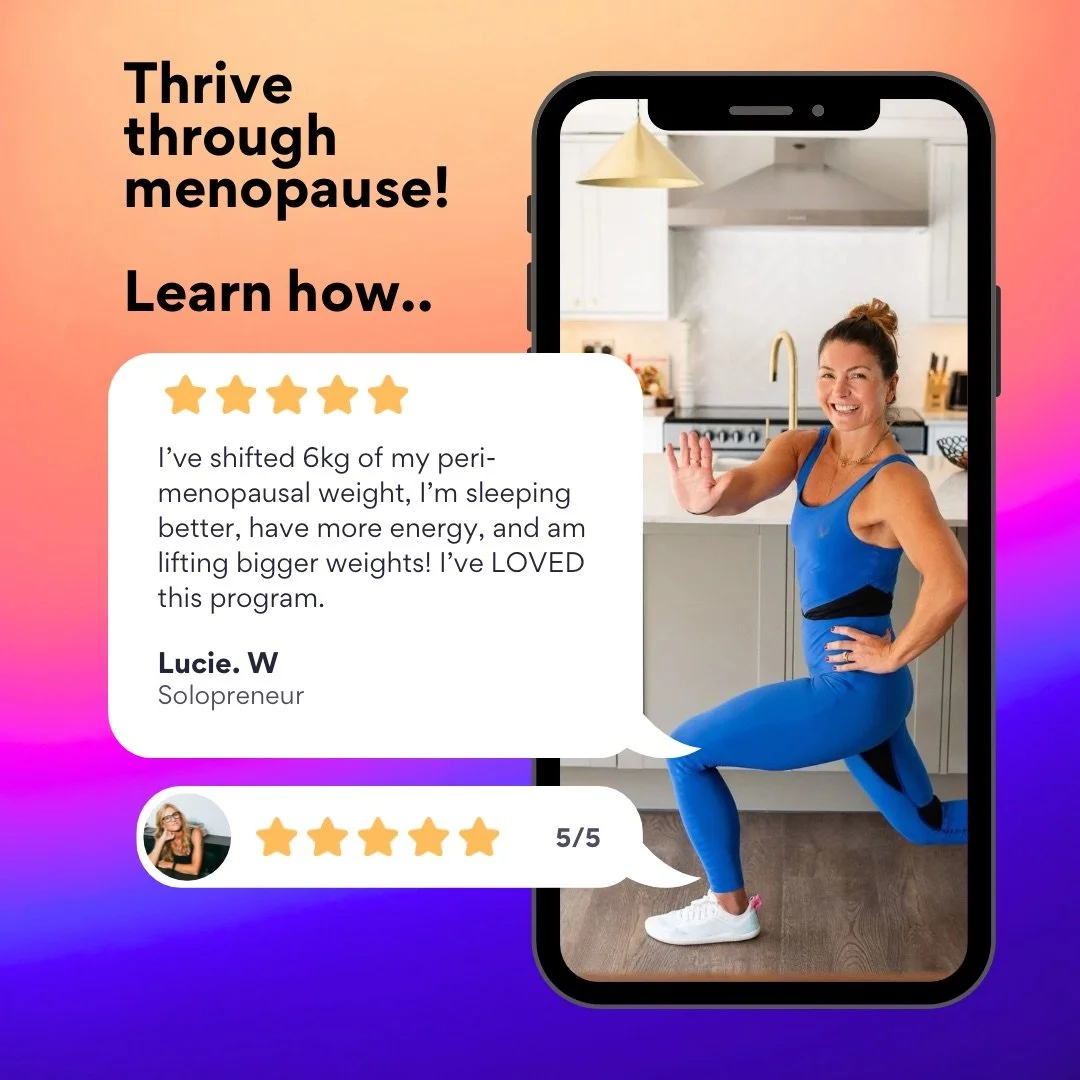Navigating perimenopause and menopause can feel overwhelming—but it doesn’t have to be. Your body is undergoing powerful changes, and what worked in your 20s and 30s won’t work now. The key to thriving? Following these seven essential rules to reclaim your health, strength, and vitality.
While some of these rules may seem familiar, the truth is, execution, consistency, and accountability are where most women fall short—and where other programs fail. Proper implementation of the fundamentals is the difference between progress and frustration.
Each rule is science-backed [ I’ve included some insight from some of my fav experts ], practical, and realistic—because this isn’t about quick fixes or unsustainable trends.
It’s about a blueprint for life - and one which my 12 week private coaching clients & 6 week group members know very well.
RULE 1: Strength Training Is Non-Negotiable
Why It’s Essential
Lifting weights isn’t really about aesthetics—sure you’ll look great but it’s about preserving muscle, boosting metabolism, protecting bone density, and enhancing longevity. After 40, muscle loss accelerates, and with it comes weight gain, decreased energy, and a higher risk of osteoporosis.
Women Need More Recovery, Not Less
Traditional fitness advice pushes intensity, but women over 40 actually need more recovery days to maximize muscle growth and hormone balance. Overtraining spikes cortisol, which increases fat storage around the midsection. The real key? Lift heavy but recover harder.
"Women are not small men. Once we hit perimenopause, we lose the hormonal advantage of estrogen for maintaining muscle. That means we need to lift heavier, not lighter, and reduce high-intensity cardio that adds stress rather than strength." – Dr. Stacy Sims, Exercise Physiologist & Nutrition Scientist
Action Plan:
✅ Train at least 2-3x per week with progressive overload (increase weights over time).
✅ Focus on compound movements like squats, deadlifts, push-ups, and rows.
✅ Avoid excessive endurance cardio—swap it for resistance-based training or sprint intervals.
Best Time to Train: Morning or early afternoon—cortisol is naturally higher in the morning, making strength training an ideal way to regulate it.
RULE 2: Protein & Nutrition Are Your Hormone Regulators
Why It’s Essential
Food is hormonal information. After 40, the right nutrition can either balance your hormones, stabilize your energy, and improve your metabolism—or cause inflammation, fatigue, and weight gain.
Timing Matters More Than Ever
Protein intake is crucial, but WHEN you eat it impacts muscle retention and energy levels. Research suggests distributing protein evenly across all meals (instead of loading it at dinner) prevents muscle breakdown and stabilizes blood sugar.
"Menopause is not a disease—it’s a wake-up call to start eating in a way that supports longevity. Prioritizing protein and whole foods is essential for metabolic health and brain function." – Dr. Mark Hyman, Functional Medicine Expert
Action Plan:
✅ 1g of protein per pound of ideal body weight daily (e.g., if your goal is 140lbs, aim for 140g protein).
✅ Prioritize lean meats, fish, eggs, tofu, lentils, and Greek yogurt.
✅ Balance blood sugar with protein, healthy fats, and fiber at every meal—NO naked carbs!
Best Time to Eat Protein: Within 60 minutes of waking up to stabilize blood sugar and cortisol levels.
RULE 3: Mindset & Self-Belief Drive Everything
Why It’s Essential
Your mindset creates your reality. If you believe you’re "too old" to change, you’ll prove yourself right. But if you decide that this is the strongest, most vibrant chapter of your life, everything shifts.
Self-Belief Isn’t Just Mental—It’s Biochemical
Your thoughts directly impact cortisol, serotonin, and dopamine levels, which influence motivation and metabolism. Women who practice positive affirmations see measurable improvements in stress resilience and physical performance.
"Self-care isn’t selfish. It’s survival. Women need to stop feeling guilty for prioritizing their health, because when they do, everyone around them benefits." – Dr. Mindy Pelz, Hormone Specialist
Action Plan:
✅ Rewrite your identity. Say: "I am a strong, healthy, and powerful woman."
✅ Daily self-care rituals. Meditation, journaling, or a morning walk to ground yourself.
✅ Set boundaries. Protect your energy. Your health is a priority, not an afterthought.
Best Time to Prioritize Mindset: Morning. Your first thoughts set the tone for the day.
RULE 4: Stress Management Is a Game-Changer
Why It’s Essential
Chronic stress kills muscle, causes weight gain, and disrupts sleep.
Magnesium Is the Stress Nutrient Women Overlook
Women in perimenopause are often magnesium-deficient, which leads to higher cortisol, poor sleep, and increased cravings. Supplementing with magnesium glycinate or magnesium L-threonate significantly reduces stress-related weight gain.
"You cannot out-supplement or out-train a high-stress lifestyle. Chronic cortisol elevation wrecks your metabolism and immune system." – Dr. Andrew Huberman, Neuroscientist
Action Plan:
✅ Identify Hidden Stressors – Keep a stress journal for a week. Look at lifestyle, nutrition, and emotional triggers.
✅ Control Cortisol in the Morning – Avoid fasted workouts and caffeine on an empty stomach (this spikes cortisol).
✅ Practice Daily Nervous System Regulation – Try breathwork (box breathing), yoga, or walking outdoors.
✅ Prioritize Magnesium – Supplement with magnesium glycinate before bed to support relaxation and muscle recovery.
✅ Set Boundaries – Learn to say no to energy-draining commitments. Protect your recovery time.
✅ Best Time for Stress-Management Practices: Mid-afternoon or evening—to reset your nervous system and prevent an evening cortisol spike.
RULE 5: Sleep Is Your Best Anti-Aging Strategy
Why It’s Essential
Poor sleep accelerates aging, disrupts metabolism, and worsens menopausal symptoms.
Deep Sleep and Growth Hormone Production
Growth hormone—essential for muscle repair and fat loss—peaks during deep sleep. Women over 40 lose 60-80% of their growth hormone production due to poor sleep.
"Quality sleep is non-negotiable for brain health, hormone balance, and longevity. If you’re not prioritizing it, you’re accelerating aging." – Dr. Louise Newson, Menopause Specialist
Action Plan:
✅ Optimize Sleep Hygiene – Make your room dark, cool (65°F/18°C), and free of electronics.
✅ Follow a Pre-Sleep Routine – Use blue-light blocking glasses, reduce screen time 60 minutes before bed, and read or journal.
✅ Regulate Cortisol Before Bed – Try magnesium glycinate, chamomile tea, or slow stretching before bed.
✅ Eat Carbs at Dinner (Yes, Really!) – A small serving of slow-digesting carbs (like sweet potato or quinoa) improves serotonin & melatonin production.
✅ Don’t Overtrain Late at Night – Avoid high-intensity workouts 2-3 hours before bed.
✅ Best Time for Sleep: 10 PM–6 AM – This aligns with natural melatonin production and maximizes recovery.
RULE 6: Creatine Is the Essential Supplement Women Need For Brain, Muscle & Gut Health!
Why It’s Essential
Creatine isn’t just for gym-goers—it protects brain function, improves mood, great for gut health and enhances cognitive clarity, which is critical during perimenopause.
"Creatine enhances cognitive function, muscle retention, and recovery—especially crucial for menopausal women." – Dr. Stacy Sims
Best Time to Take Creatine: Anytime really! Unless yours [ like mine ] is formulated to be a pre-workout with a kick [ mine has green tea for added energy ] in which case take it 15-20mins before your workout.
Action Plan:
✅ Take 3-5g Creatine Monohydrate Daily – No need to "load" it; just be consistent.
✅ Pair Creatine with Electrolytes – This improves hydration and muscle function.
✅ Hydrate Properly – Creatine works best when you’re drinking enough water!
✅ Use a High-Quality Brand – Look for pure creatine monohydrate with no additives.
RULE 7: Consider HRT & Other Vital Interventions
Why It’s Essential
HRT is not just about symptom relief—it protects the brain, heart, and bones and reduces the risk of dementia and cardiovascular disease in postmenopausal women.
"HRT is not just about symptom relief—it’s disease prevention. We need to reframe the conversation around menopause care." – Dr. Louise Newson
Action Plan:
✅ Get Your Hormones Tested – Work with a hormone-literate doctor to assess estrogen, progesterone, testosterone, and thyroid function.
✅ Consider Bioidentical HRT (if suitable) – Discuss estradiol, progesterone, and testosterone replacement options with your doctor.
✅ Prioritize Bone & Heart Health – If you don’t take HRT, you NEED a plan for bone density and cardiovascular health.
✅ Increase Omega-3 Intake – Supports brain function, inflammation control, and hormone production.
✅ Best Time to Evaluate HRT: Mid-to-late 40s – The earlier you address menopause health, the better.
Take the Next Step: Book a Call With Me & Get Personalized Coaching [ either 1:1 or via group ]
Understanding these principles is the first step toward transformation. But knowing isn’t enough—you need the right strategy, execution, and accountability.
Book a complimentary consultation call today to explore my science-backed and results-proven 6- to 12-week programs.
📩 CLICK HERE TO BOOK YOUR CALL
This is YOUR time. Let’s make it happen.
With love & respect always,
Pieta x

